This post may contain affiliate links. Please read our disclosure policy.
Toasting almonds is like unlocking a treasure chest of flavor hidden within these humble nuts. Whether you prefer them whole, slivered, or sliced, a little heat can transform almonds from simple to so good, bringing out a depth of taste and aroma that raw almonds can only dream of. This simple guide on how to toast almonds offers two paths to golden, fragrant perfection: a gentle bake in the oven or a quick toss in a skillet on the stovetop.
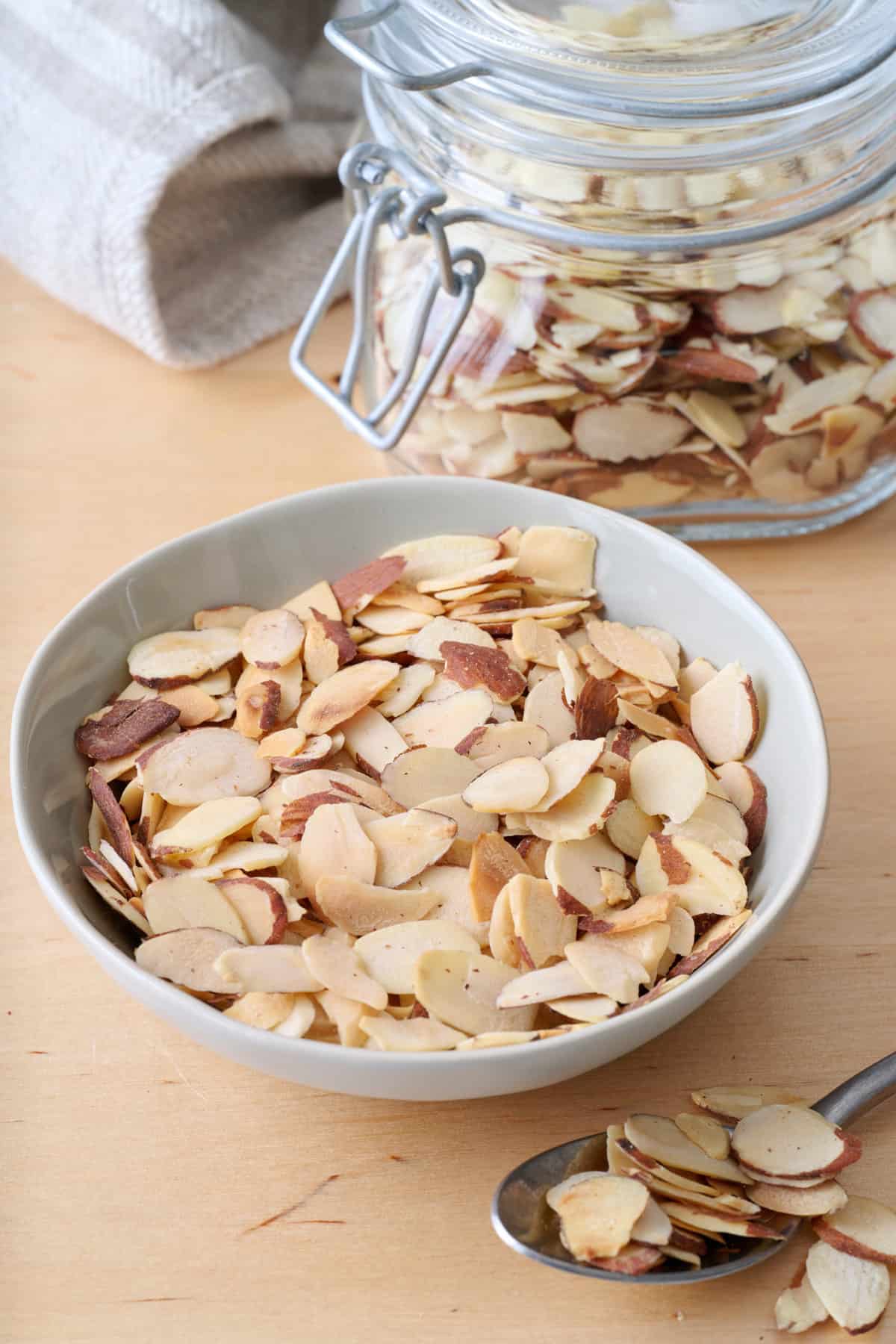
Table of Contents
I love toasted almonds! Not only do toasted almonds elevate any dish they touch, from my Spinach Strawberry Salad to almond joy bars, but they also make a fantastic snack on their own. Store them properly, and you’ll have toasted almonds on hand for up to 3 months, ready to sprinkle a bit of crunchy, toasty goodness whenever the mood strikes. So grab a cup of almonds, and let’s get toasting!
Why Learn How to Toast Almonds
- Enhances flavor. Toasting brings out the natural nuttiness of almonds, intensifying their rich flavor and making them more aromatic.
- Wide range of uses. Toasted almonds, in any shape or form, can be used in various sweet and savory dishes. Enjoy whole toasted almonds as a healthy snack, or add slivered almonds to salads or desserts.
- Upgrades crunchy texture. Toasting almonds transforms their texture from ordinary to satisfyingly crispy and delicious. It’s a simple kitchen skill that makes every bite more enjoyable.
Ingredients to Make Toasted Almonds
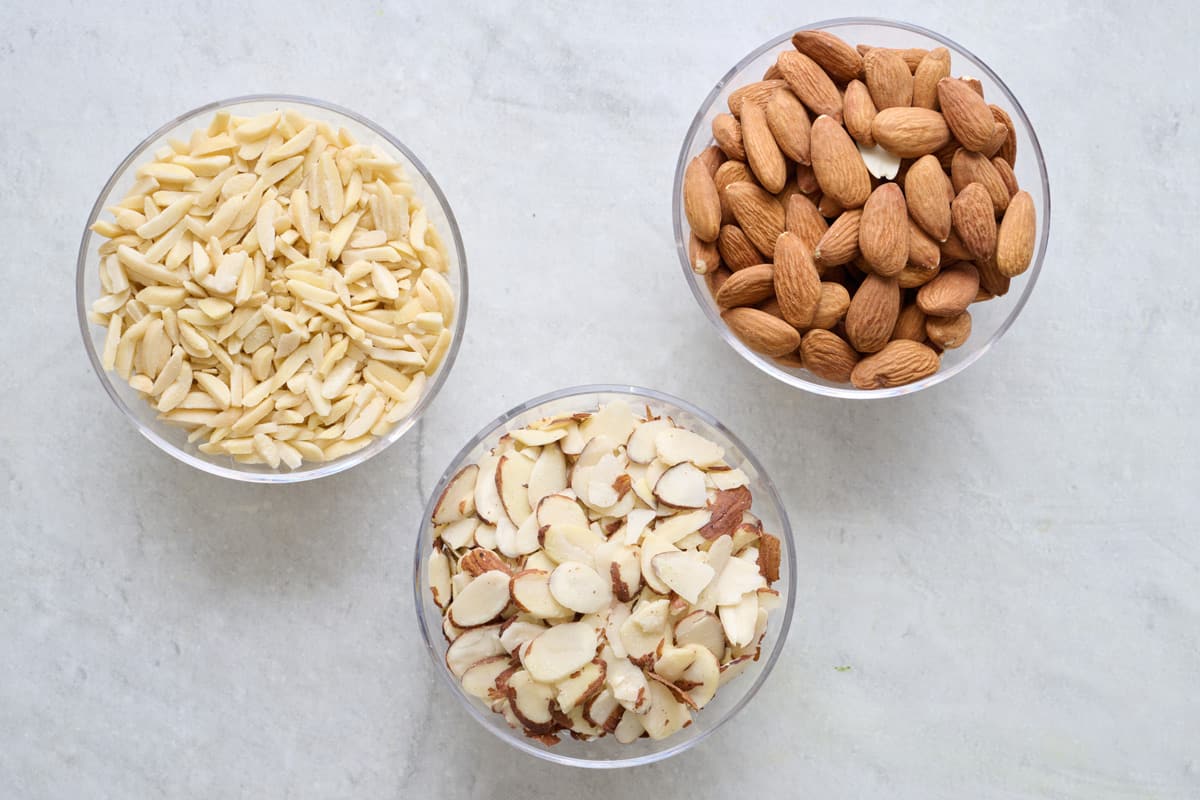
- Almonds: Make sure you use unsalted and raw almonds. You can go with whole almonds, sliced, or slivered almonds, depending on the recipe and the purpose of the almonds, but they must be raw and unseasoned.
How to Toast Almonds
Toasting almonds is a simple kitchen technique that can really take any dish to the next level. You’ll learn how to toast almonds in the oven or on the stovetop using whole almonds, sliced, or slivered!
How to Toast Whole Almonds in the Oven
- Place the almonds on a quarter-size rimmed baking sheet and shake it around to distribute the almonds evenly in a single layer.
- Roast in a preheated oven, stirring once halfway through, until they are fragrant and golden brown. Enjoy immediately or store for later use.
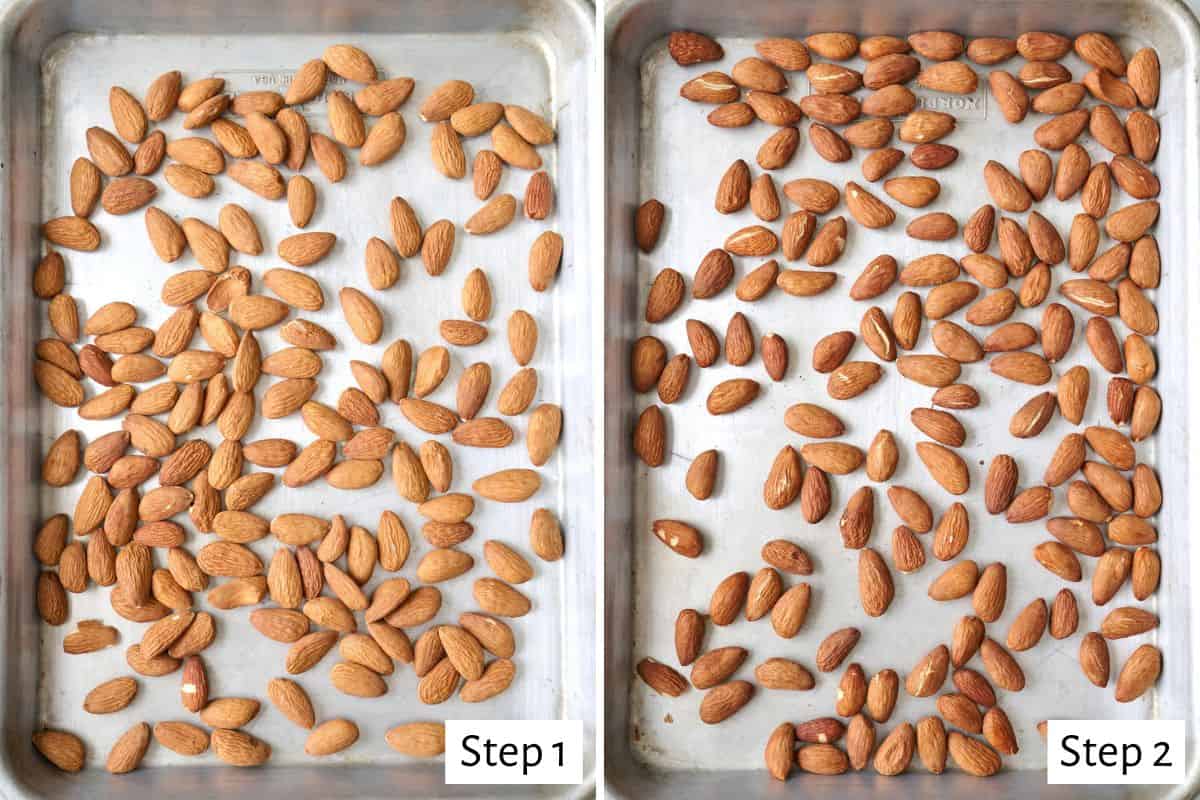
How to Toast Sliced Almonds on the Stove
- Heat a large skillet over medium heat. Add the sliced almonds to the dry pan and toast, stirring frequently.
- Toast until they become fragrant and golden brown. Enjoy warm or store at room temperature.
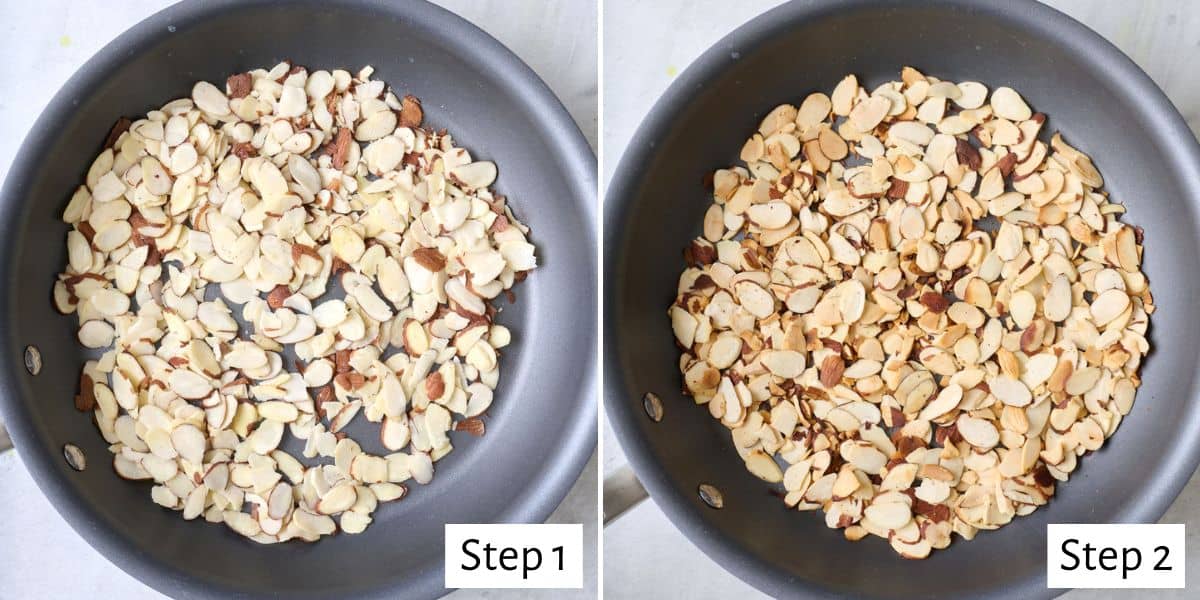
How to Toast Slivered Almonds on the Stove
- Heat a large skillet over medium heat. Add the slivered almonds to the dry pan and toast, stirring frequently.
- Toast until the almonds become fragrant and golden brown. Enjoy warm or store at room temperature.
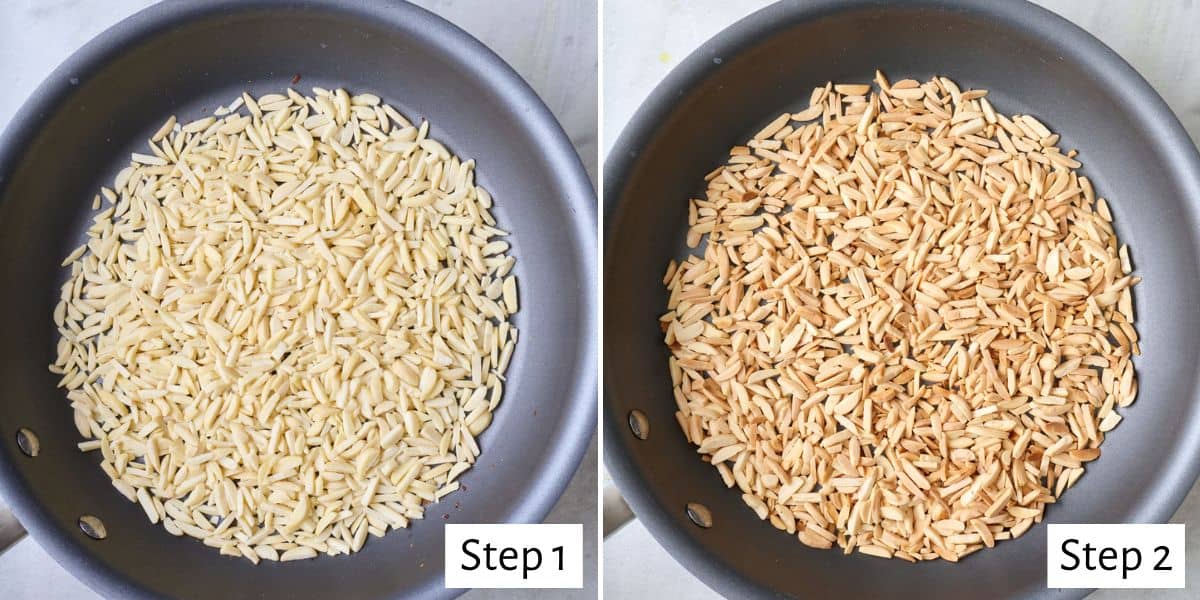
Tips for Toasting Almonds
- Watch the heat closely to prevent the almonds from turning too dark and bitter. You want them beautifully golden, not burnt.
- Stir frequently. This isn’t necessary in the oven (just once will suffice) but if you are toasting sliced or slivered almonds on the stove, it’s important that you stir them often to prevent burning them.
- Follow your sense of smell. Ovens and stovetops vary, and nuts can go from pleasant to burnt in a matter of seconds. When a rich, nutty aroma fills the air, it’s a sign your almonds are nearing perfection.
- Wait until the almonds are completely cooled before storing. Transferring warm almonds into a storage container can lead to condensation, which will compromise their crispy and crunchy texture. Wait for them to cool and firm up before storing them.
Recipes to Make With Toasted Almonds
- Green Beans with Toasted Almonds
- Cranberry Almond Granola
- Oatmeal Breakfast Bars
- Almond Joy Bars
- Date Bark
- Spinach Strawberry Almond Salad
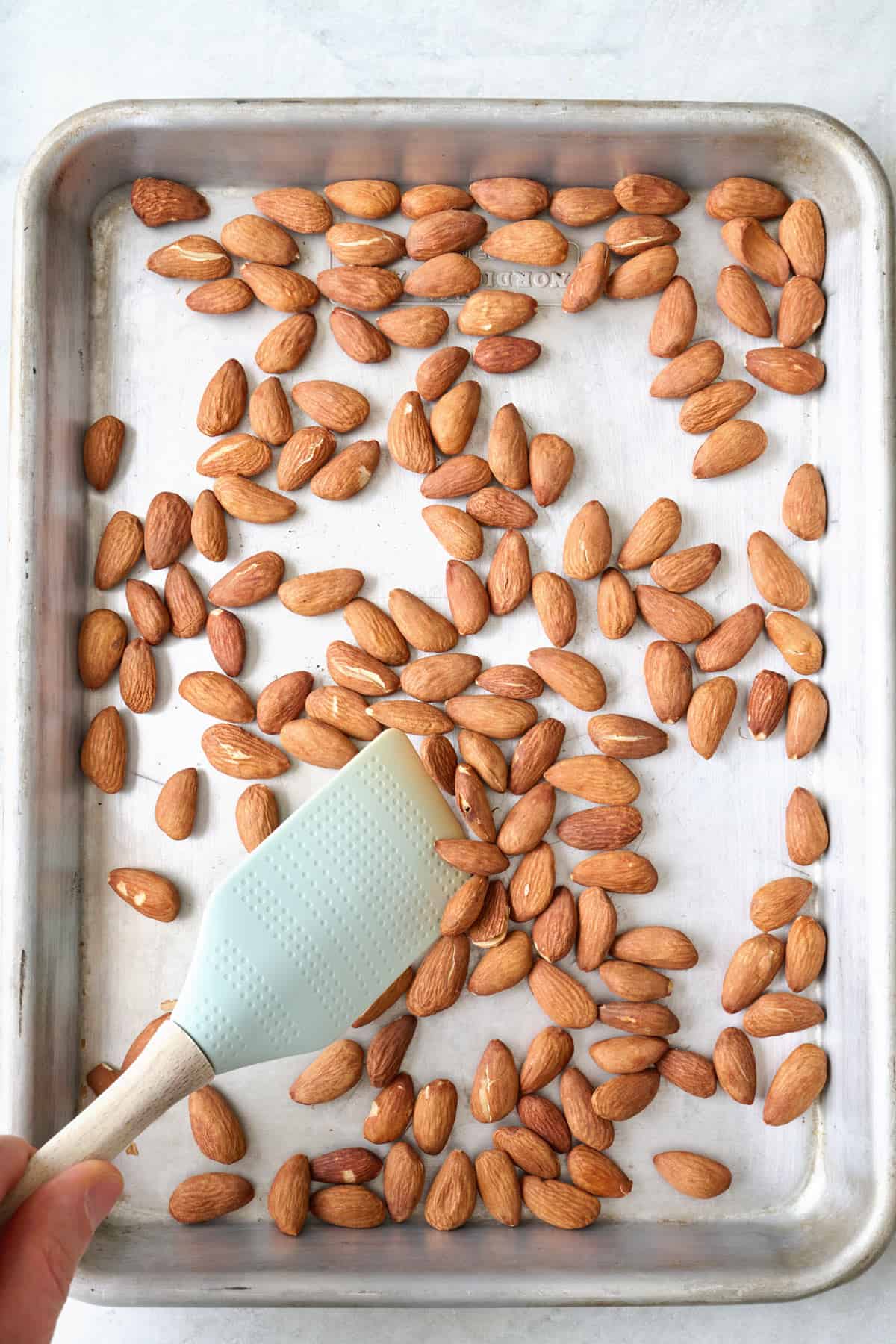
How to Store Toasted Almonds
Allow the toasted almonds to cool completely before transferring them into an airtight container. Store at room temperature for up to 3 months.
How Long Will Toasted Almonds Last in the Fridge?
For longer storage, you can store toasted almonds in the fridge for up to 6 months. Make sure the container is tightly sealed to prevent exposure to air or moisture, which will soften them.
Can I Freeze Toasted Almonds?
Yes, if you want to extend almond shelf life even more, you can store toasted almonds in the freezer for up to 1 year. Ensure they are in a well-sealed, freezer-safe container or bag to avoid freezer burn. Thaw at room temperature for an hour before adding to recipes.
Frequently Asked Questions
The best method for toasting whole almonds is using an oven as it allows for even and controlled heat distribution. Their bigger size, compared to slivered or sliced almonds, makes it easier to achieve the perfect level of crunchiness in the oven.
No! Almonds contain natural oils that are released during the toasting process, enhancing their flavor. Simply toasting them in a dry pan without any added oil allows you to enjoy the pure, nutty goodness without additional fat.
Follow your senses to determine when toasted almonds are done. When they have that golden-brown color, release a rich and nutty aroma, and have that desired crunchiness – you know it’s time to pull them from the heat.
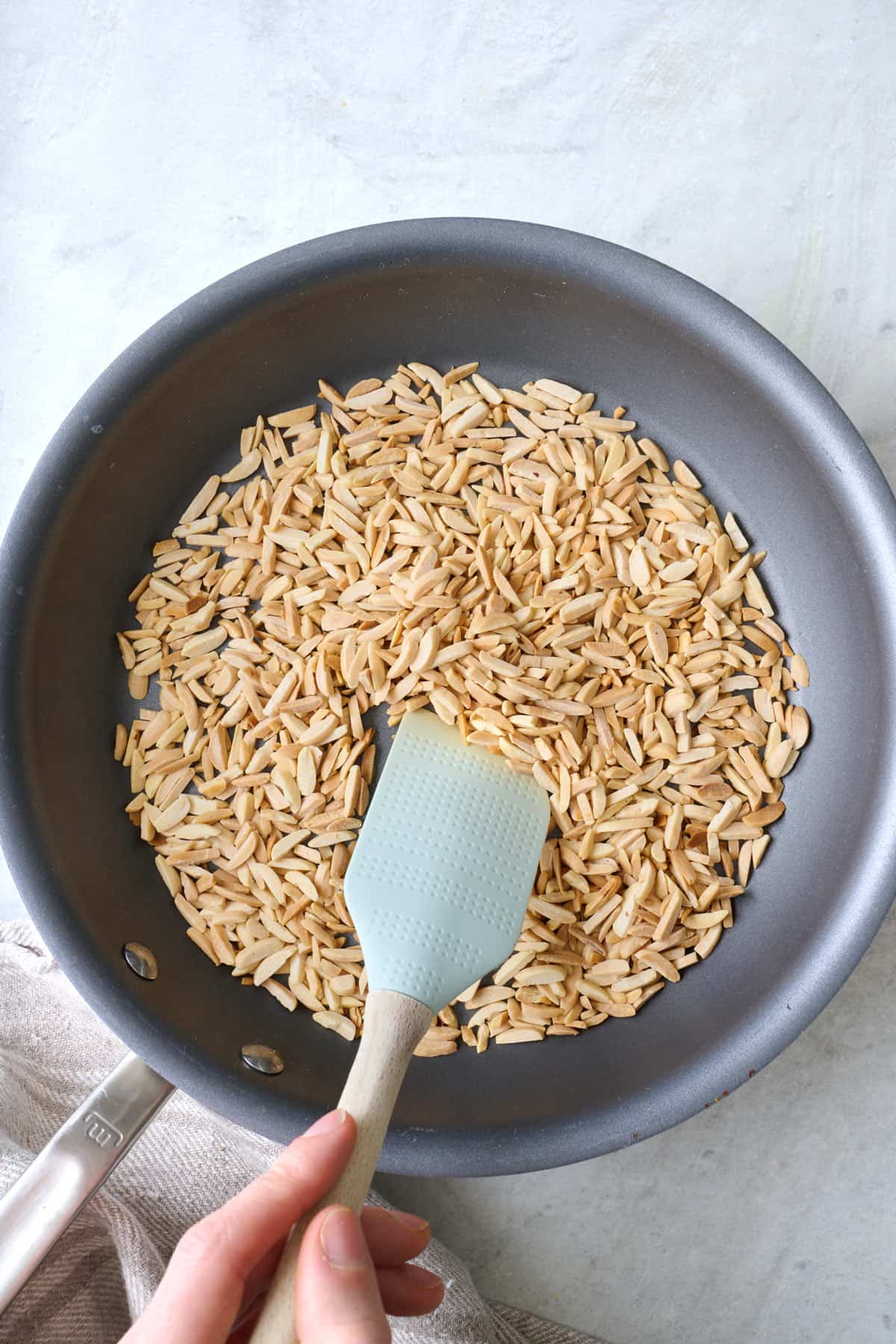
Knowing how to toast almonds on the stove or in the oven opens up a world of delicious crunchiness in your kitchen. Toasting almonds enhances their natural nuttiness and instantly elevates any salad, dessert, or dish!
More Nut and Seed Cooking Tutorials:
- How to Make Candied Pecans
- How to Toast Pecans
- How to Make Muesli
- How to Toast Sesame Seeds
- How to Make Granola
- How to Make Candied Walnuts
- How to Roast Sunflower Seeds
- How to Roast Pumpkin Seeds
If you found this tutorial for How to Toast Almonds – 2 Ways helpful or if you try any recipe on Feel Good Foodie, then don’t forget to rate the recipe and leave a comment below! It helps others who are thinking of trying out this tutorial and we would love to hear about your experience. And if you snapped some shots, share it on Instagram so we can repost on Stories!
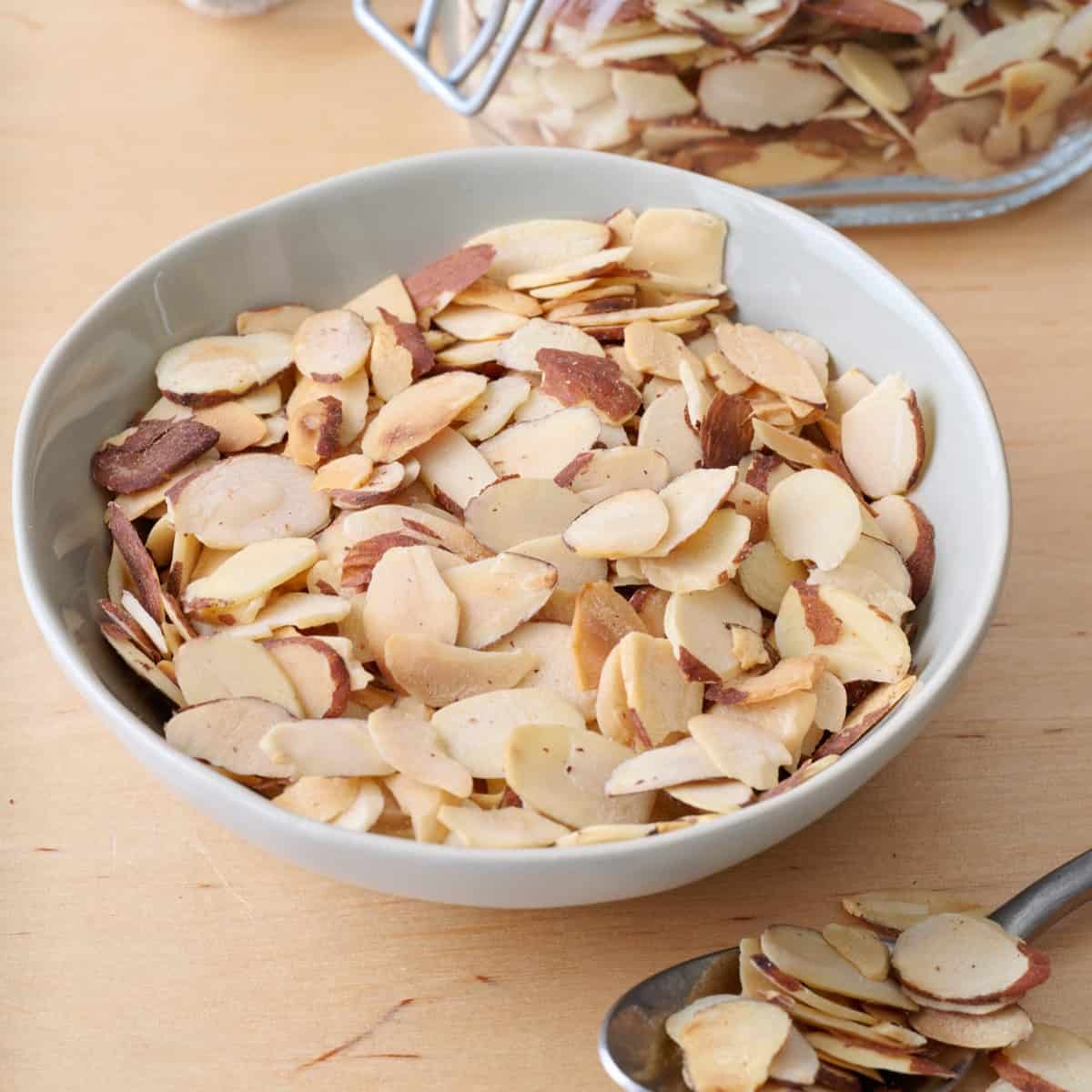
How to Toast Almonds (2 ways)
Ingredients
- 1 cup almonds whole, slivered or sliced
Instructions
In the Oven
- Preheat the oven to 350˚F.
- Place the almonds on a quarter rimmed baking sheet and shake it around to evenly distribute the almonds in a single layer.
- Bake for 7 to 9 minutes, stirring once halfway through, until they become fragrant and golden brown. Enjoy warm or store for later use at room temperature for up to 3 months.
On the Stovetop
- Heat a large skillet over medium heat. Add the almonds to the dry pan and toast for 5 to 7 minutes, stirring frequently until they become fragrant and golden brown. Enjoy warm or store for later use at room temperature for up to 3 months.
Notes
Nutrition
Nutrition information provided is an estimate. It will vary based on cooking method and specific ingredients used.





